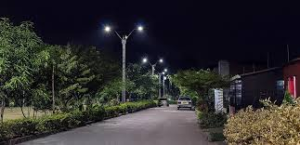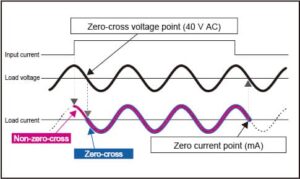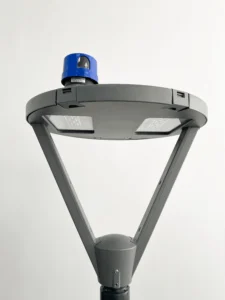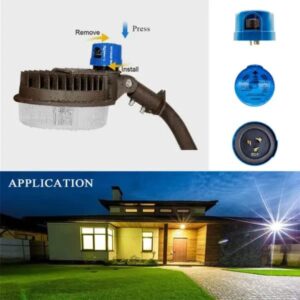Do anoitecer aos dados: como fotocélulas inteligentes como as da Longjoin estão liderando a revolução da iluminação externa
Introduzir
O 2025 LightFair International (LFI) exhibition signalled a pivotal shift: photocell technology is no longer passive, but the heart of smart street light controller systems. As lighting systems evolve to embrace DALI+ wireless, Dark Sky compliance, energy analytics, and mesh networks, manufacturers’ photocell offerings like Longjoin’s must adapt to stay ahead. With over 20 years of certification in UL, CE, RoHS, and experience supplying photocell for street light applications, Longjoin is poised to lead the transformation from simple photocell control switches into intelligent IoT lighting nodes.
1. What Global Tech Trends Are Redefining Smart Photocell Evolution?
1.1 What Role Does DALI+, ZigBee, And Wireless Interoperability Play?
DALI+ has just earned top honours at LFI 2025 for delivering wireless and IP‑based lighting control across the industry. It builds on the well‑established DALI‑2/D4i standards, while using Thread mesh networking to extend trusted lighting control capabilities wirelessly.
For Longjoin, adopting DALI+ means enabling light sensor photocell switch modules that support ZigBee, BLE Mesh, LoRa, e D4i connectivity, ensuring photocell street light systems speak native protocols used in smart city grids.
1.2 How Is Dark Sky Regulation Reshaping Demand For Photocell Lighting Sensors?
Recent research from DarkSky International’s Artificial Light at Night: State of the Science 2025 emphasizes increasing scientific and regulatory pressure on municipalities to reduce light pollution and enforce warm‑tone lighting with precise control. As a result, outdoor photocell light sensor requirements now include dimming curves, UV‑filtering, and spectral tuning—not just ON/OFF.
Longjoin’s roadmap should embrace lux‑level capping, adaptive dimming, and tight neutral colour control in its photocell sensor LED street light modules, enabling compliant and environmentally responsible lighting control.
1.3 Why Is Energy And Failure Data Critical At The Asset Level?
The LFI show highlighted that operators now demand embedded energy metering, real‑time failure alerts, and cloud dashboards tied to each lighting node. This implies photocell devices need built‑in power measurement, predictive analytics, and remote diagnostics.
A modern smart remote control switch or photo control sensor must go beyond sensing dawn‑to‑dusk: it must measure consumption, report anomalies, and support OTA updates.
2. How Should Longjoin Scale Its Core Photocell Product To Meet Future-Ready Expectations?
2.1 Can Longjoin Evolve Its Protocol Support Beyond LoRa/NB‑IoT?
Yes. Longjoin products like zhaga controller series already support automatic light control switches across AC and DC voltages. To embrace smart lighting ecosystems, they should layer in DALI‑2, D4i certification, and mesh protocols such as ZigBee and Thread.
This would turn a basic photocell switch into a smart photocell sensor capable of feeding and receiving lighting control commands in integrated systems.
2.2 What Sensors And Environmental Feedback Should Be Embedded?
Beyond measuring ambient light, long‑join.com’s future modules can include sensors for air quality, humidity, vibration, and predictive‑AI maintenance logic — enabling a photocell street device to serve as a multi‑purpose urban data node.
This broadens value into smart city support, where sensor fusion transforms each photoelectric sensor into a node within environmental and traffic monitoring networks.
2.3 How To Integrate Energy Analytics And Predictive Alerts?
Modern smart photocells offer far more than just ON/OFF functionality. With embedded energy metering and predictive maintenance logic, they help cities cut costs, prevent outages, and streamline operations.
Below is an example of how energy analytics improves operational efficiency:
Functionality | Without Analytics | With Smart Photocell |
Failure Response | Manual (after blackout) | Proactive (pre-failure alerts) |
Custo de manutenção | Mais alto | Lower due to early detection |
Energy Consumption Awareness | Nenhum | Real-time visibility |
Operational Planning | Guesswork | Data-driven scheduling |
Lifecycle ROI | Difficult to assess | Measurable and optimized |
By integrating energy analytics, Longjoin photocells support real-time power monitoring and predictive alerts—an essential capability for energy performance contracts (EPCs) in the US and EU.
3. What Strategic Product Innovations Can Position Longjoin As A Smart Lighting Leader?
3.1 What If Longjoin Launched A Smart Photocell Series Like The JL‑243S?
Imagine modules such as Longjoin’s JL‑243S equipped with D4i interface + ZigBee remote override + dimming output, fully certified for DALI+/D4i. These would empower lighting manufacturers and cities to easily integrate photocell street light controllers into their platforms.
3.2 How Can API And Open‑Platform Support Widen Adoption?
Providing APIs and open‑platform integration with ecosystems such as SmartThings, Huawei HarmonyOS, e AliLink IoT enables seamless deployment. Longjoin’s smart photocells could plug directly into city management systems and IoT dashboards, supporting remote configuration and monitoring.
3.3 Why Embed Sensor Fusion With Other Smart City Devices?
By supporting fusion with motion, sound, or smoke detectors, Longjoin’s smart photocell modules can not only control lighting based on dusk or activity, but serve as emergency data nodes, triggering adaptive responses to environmental changes or incidents.
3.4 How To Create Retrofit Bundles Compliant With EU And US Energy Programs?

4. What Common Technical Challenges Must Longjoin Explain Clearly—And How?
4.1 How Can Longjoin Articulate Protocol Complexity In Plain Language?
Explain that:
- DALI+ uses wireless IP (Thread, ZigBee, Wi‑Fi) to communicate lighting commands—no more messy wiring.
- A photocell controldevice with DALI‑2 certification works across brands.
- Mixing protocols without certification leads to integration issues; certified devices from manufacturers photocelllike Longjoin ensure seamless interoperability.
4.2 How To Showcase Environmental And Energy Sensing Practically?
Smart photocells can collect more than just ambient light data. They now serve as environmental sentinels—helping city managers monitor air, sound, temperature, and motion data to support smarter decisions.
Let’s see what enhanced environmental sensing adds:
Tipo de sensor | Basic Photocell | Longjoin Smart Photocell |
Daylight Detection | ✅ | ✅ |
Motion Detection | ❌ | ✅ |
Air Quality | ❌ | ✅ |
Noise Monitoring | ❌ | ✅ |
Temperature Sensor | ❌ | ✅ |
These enhanced sensors turn every photocell into an IoT node—offering valuable insights beyond lighting. For example, motion sensors can dim lights during low-traffic hours, and air quality monitors can trigger city-wide alerts for pollution spikes.
4.3 Why Describe Compliance Features In Consumer Terms?
Instead of technical jargon, explain:
- “IP68 ensures the photocell works even in heavy rain or dust storms.”
- “UL773 and ANSIC certification mean safety in public streets.”
Use real analogies and local relevance for readability.
5. What Roadmap Can Outline Longjoin’s Next Decade Of Innovation?
What’s the 10‑year vision for the smart photocell seller?
- Year 1–2:Launch JL‑243S smart photocell series (Dali+/ZigBee/BLE), begin D4i certification.
- Year 2–4:Expand sensor fusion—add modules with air, vibration, and ambient intelligence.
- Year 3–5:Roll out integrated energy monitoring dashboards and predictive alerts—EPC retrofit bundles.
- Year 5–10:Partner with smart city platforms, support OTA firmware updates, enable city‑wide adaptive lighting networks.
Conclusão
Lighting is becoming more connected, dark‑sky‑friendly, and energy‑smart. Photocells will not only switch lights but also sense conditions, share data, and optimize city lighting.
This decade is Long-Join’s chance to own the smart lighting node category. We have large‑scale manufacturing and UL‑certified quality. We also have proven partnerships with Philips, Cree, and Tork.
Want to lead the smart lighting revolution?
Reach out to our team to explore the JL-243S, JL-207, or schedule a consultation for your customized smart photocell roadmap.
Links externos:
●https://lightfair.us.messefrankfurt.com/us/en.html
●https://www.ul.com/solutions
●https://www.cecertmodel.com/home
●https://en.wikipedia.org/wiki/RoHS
●https://edisonreport.com/2025/06/11/dali-plus-lightfair-2025-awards/
●https://www.led-professional.com/all/dali-delivers-dali-lighting-control-with-wireless-and-ip-based-networking
●https://www.digi.com/solutions/by-technology/zigbee-wireless-standard
●https://en.wikipedia.org/wiki/Bluetooth_mesh_networking
●https://en.wikipedia.org/wiki/LoRa
●https://www.dali-alliance.org/d4i/
●https://darksky.org/news/state-of-the-science-2025/
●https://www.samsung.com/us/smartthings/
●https://consumer.huawei.com/en/harmonyos/
●https://www.alibabacloud.com/en/product/iot?_p_lc=1






